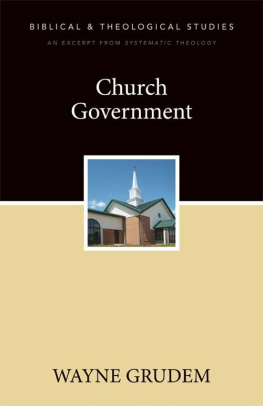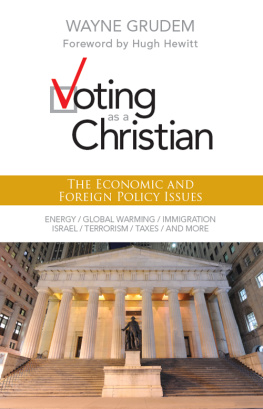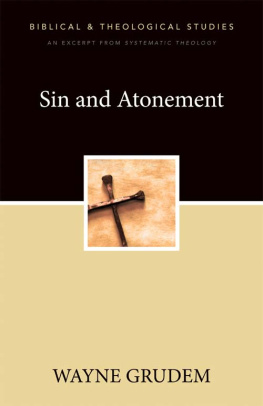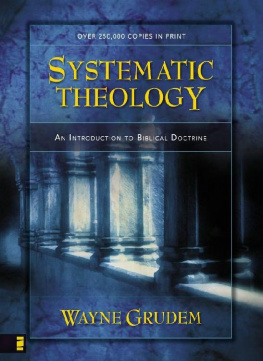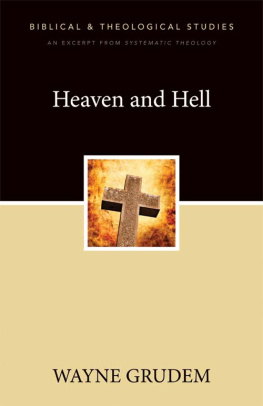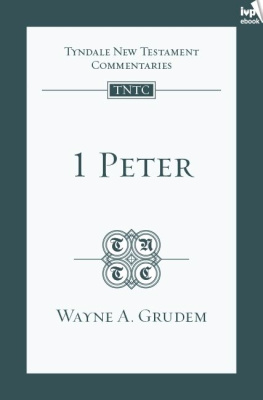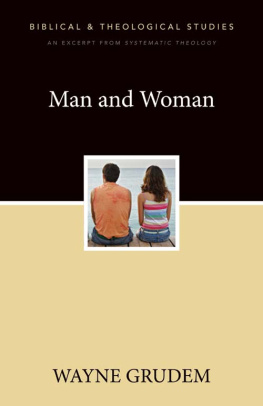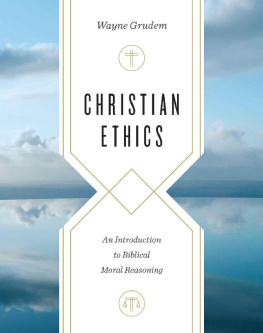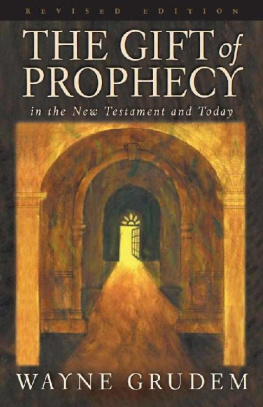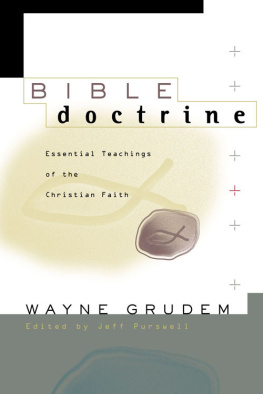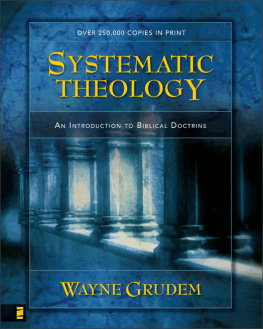Wayne A. Grudem - Church Government: A Zondervan Digital Short
Here you can read online Wayne A. Grudem - Church Government: A Zondervan Digital Short full text of the book (entire story) in english for free. Download pdf and epub, get meaning, cover and reviews about this ebook. year: 2012, publisher: Zondervan Academic, genre: Politics. Description of the work, (preface) as well as reviews are available. Best literature library LitArk.com created for fans of good reading and offers a wide selection of genres:
Romance novel
Science fiction
Adventure
Detective
Science
History
Home and family
Prose
Art
Politics
Computer
Non-fiction
Religion
Business
Children
Humor
Choose a favorite category and find really read worthwhile books. Enjoy immersion in the world of imagination, feel the emotions of the characters or learn something new for yourself, make an fascinating discovery.
- Book:Church Government: A Zondervan Digital Short
- Author:
- Publisher:Zondervan Academic
- Genre:
- Year:2012
- Rating:5 / 5
- Favourites:Add to favourites
- Your mark:
- 100
- 1
- 2
- 3
- 4
- 5
Church Government: A Zondervan Digital Short: summary, description and annotation
We offer to read an annotation, description, summary or preface (depends on what the author of the book "Church Government: A Zondervan Digital Short" wrote himself). If you haven't found the necessary information about the book — write in the comments, we will try to find it.
Church Government: A Zondervan Digital Short — read online for free the complete book (whole text) full work
Below is the text of the book, divided by pages. System saving the place of the last page read, allows you to conveniently read the book "Church Government: A Zondervan Digital Short" online for free, without having to search again every time where you left off. Put a bookmark, and you can go to the page where you finished reading at any time.
Font size:
Interval:
Bookmark:
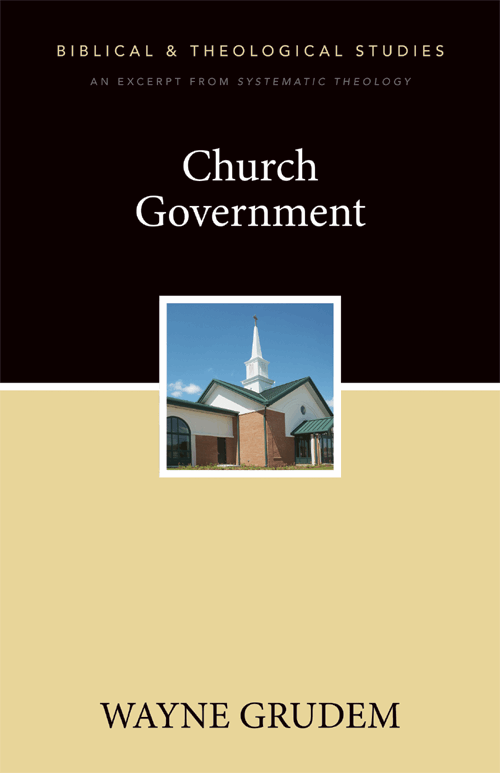

Church Government
Previously published in Systematic Theology
Copyright 1994 by Wayne Grudem
Appendix 6 and glossary copyright 2000 by Wayne Grudem
Requests for information should be addressed to:
Zondervan, Grand Rapids, Michigan 49530
EPub Edition JANUARY 2012 ISBN-13: 978-0-310-49619-9
Unless otherwise noted, Scripture quotations are taken from the Revised Standard Version of the Bible, copyright 1946, 1952, 1971, by the Division of Christian Education of the National Council of Churches of Christ in the USA, and are used by permission. However, the author has, with permission, modernized archaic personal pronouns and has changed the verbs accordingly.
Scripture quotations marked NASB are from the New American Standard Bible, copyright 1960, 1962, 1963, 1968, 1971, 1972 by the Lockman Foundation, La Habra, California. Used by permission.
Those marked NIV are from the Holy Bible: New International Version. NIV. Copyright 1973, 1978, 1984 by International Bible Society. Used by permission of Hodder and Stoughton Ltd. and Zondervan.
Use of italic in Scripture quotations indicates Wayne Grudems emphasis.
Any Internet addresses (websites, blogs, etc.) and telephone numbers in this book are offered as a resource. They are not intended in any way to be or imply an endorsement by Zondervan, nor does Zondervan vouch for the content of these sites and numbers for the life of this book.
All rights reserved under International and Pan-American Copyright Conventions. By payment of the required fees, you have been granted the non-exclusive, non-transferable right to access and read the text of this e-book on-screen. No part of this text may be reproduced, transmitted, down-loaded, decompiled, reverse engineered, or stored in or introduced into any information storage and retrieval system, in any form or by any means, whether electronic or mechanical, now known or hereinafter invented, without the express written permission of Zondervan.
Cover design: Ron Huizinga
Contents
: Church Government
How should a church be governed? How should church officers be chosen? Should women serve as pastors of churches?
Churches today have many different forms of government. The Roman Catholic Church has a worldwide government under the authority of the Pope. Episcopalian churches have bishops with regional authority, and archbishops over them. Presbyterian churches grant regional authority to presbyteries and national authority to general assemblies. On the other hand, Baptist churches and many other independent churches have no formal governing authority beyond the local congregation, and affiliation with denominations is on a voluntary basis.
Within local churches, Baptists often have a single pastor with a board of deacons, but some have a board of elders as well. Presbyterians have a board of elders and Episcopalians have a vestry. Other churches simply have a church board.
Is there a New Testament pattern for church government? Is any one form of church government to be preferred over another? These are the questions addressed in this chapter.
However, at the outset it must be said that the form of church government is not a major doctrine like the Trinity, the deity of Christ, substitutionary atonement, or the authority of Scripture. Although I believe, after examining the New Testament evidence, that one particular form of church government is preferable to the others, nevertheless, each form has some weaknesses as well as strengths. And church history attests that several different forms of government have worked fairly well for several centuries. Moreover, while some aspects of church government seem to be reasonably clear from the New Testament, other matters (such as the way in which church officers should be chosen) are less clear, mainly because the New Testament evidence on them is not extensive, and thus our inferences from this evidence are less certain. It seems to me, then, that there ought to be room for evangelical Christians to differ amicably over this question, in the hope that further understanding may be gained. And it also seemsthat individual Christianswhile they may have a preference for one system or another, and while they may wish at appropriate times to argue forcefully for one system over anothershould nevertheless be willing to live and minister within any of several different Protestant systems of church government in which they may find themselves from time to time.
But I do not mean to say that this is an entirely unimportant matter. In this area as well as others, a church may be more or less pure. If there are clear New Testament patterns regarding some aspects of church government, then there will be negative consequences in our churches if we disregard them, even if we cannot foresee all of those consequences at the present time. Therefore Christians are certainly free to speak and write on this subject in order to work for increased purity in the church.
In this chapter we shall first survey the New Testament data concerning church officers, especially apostle, elder, and deacon. Then we shall ask how church officers should be chosen. After that we shall look at two controversial questions: Which form of church governmentif anyis closest to the New Testament pattern? And, may women serve as officers in the church?
For purposes of this chapter, we will use the following definition: A church officer is someone who has been publicly recognized as having the right and responsibility to perform certain functions for the benefit of the whole church.
According to this definition, elders and deacons would be considered officers in a church, as would the pastor (if that is a distinct office). The church treasurer and church moderator would also be officers (these titles may vary from church to church). All of these people have had public recognition, usually at a service in which they are installed or ordained in an office. In fact, they need public recognition in order to fulfill their responsibilities: for example, it would not be appropriate for people to wonder from week to week who was to receive the offering and deposit it in the bank, or for various people to argue that they had been gifted to take that responsibility in any particular week! The orderly functioning of the church requires that one person be recognized as having that responsibility. Similarly, the pastor who is responsible to do Bible teaching each Sunday morning must be recognized as having the right and responsibility to do that (at least, in most forms of churchgovernment). If this were not the case, then many people might prepare sermons and all claim the right to preach, or on some Sundays no one might prepare. Similarly, in order for people to follow the elders of the church and look to them for guidance, they must know who the elders are.
By contrast, many other people exercise gifts in the church, but we do not say they have an office because they do not need formal public recognition for their gifts to function. Those who have a gift of helps (see 1 Cor. 12:28), or who have a gift of especially strong faith, or a gift of distinguishing between spirits (1 Cor. 12:10), or a gift of exhorting or contributing (Rom. 12:8) do not need public recognition in order to function effectively in the church.
Font size:
Interval:
Bookmark:
Similar books «Church Government: A Zondervan Digital Short»
Look at similar books to Church Government: A Zondervan Digital Short. We have selected literature similar in name and meaning in the hope of providing readers with more options to find new, interesting, not yet read works.
Discussion, reviews of the book Church Government: A Zondervan Digital Short and just readers' own opinions. Leave your comments, write what you think about the work, its meaning or the main characters. Specify what exactly you liked and what you didn't like, and why you think so.

